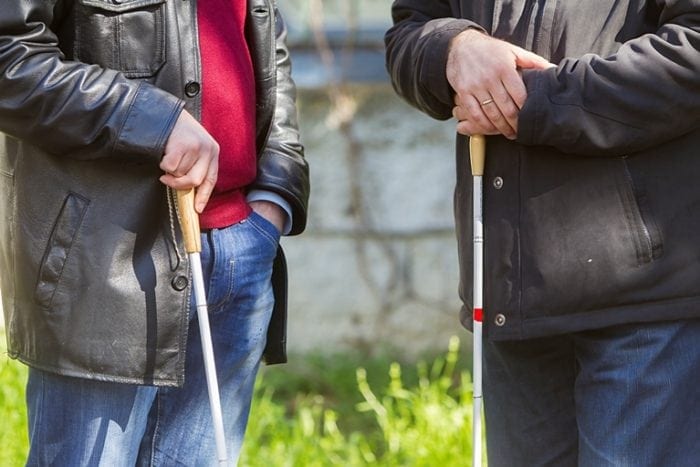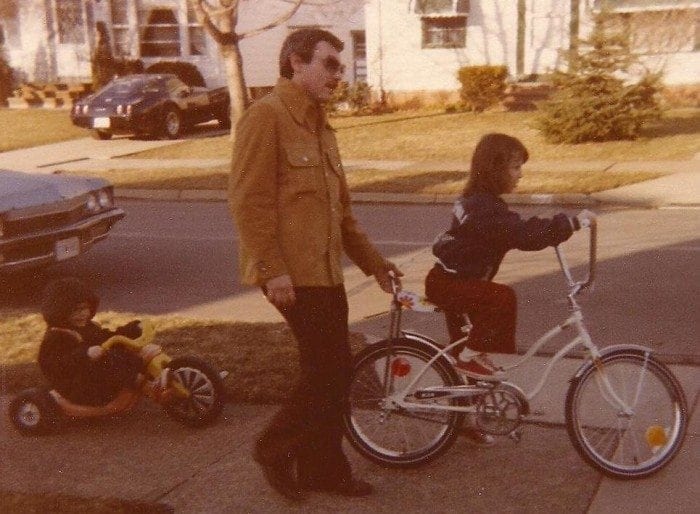Why Yes, Both of My Parents Are Blind
Published onSome of my friends shared a photo of a pilot walking through an airport holding a white cane and wearing dark sunglasses. The caption reads, “Pilot nails Halloween Costume.” or “This pilot has a great sense of humor.” My response to each of them, “How do you know the person isn’t blind and dressed up like a pilot?”
While my question is a little snarky, it is also on point as both of my parents are blind. My parents both have a sharp sense of humor, and I could easily see one of them doing this as they catch a flight on Halloween.
In fact, one Christmas, my parents put all of the Christmas tags on every single present in Braille. It was so elaborate that they even swapped the gift tags from sighted friends and family members. We kids had no idea which present belonged to whom and were stuck waiting for our parents to wake up and hand the gifts out, one-by-one. Not only are they hilarious, but we also never get one over on them.
What? Both of Your Parents are Blind?
I apologize for shocking you. It took me a long time to even realize that having blind parents was something that many people could not fathom. Yes, they are both completely blind and have been since before I was born. Yet here I am at 47 years old living to write about it.
What Is It Like Having Parents Who Are Blind?
The question of, “What is it like having parents who are blind?” can be answered with a simple response, “Normal for me, what is it like having sighted parents?” It’s a tough question to answer because I knew nothing different. I assume it would be equally as hard for someone to explain being raised by parents who have sight.
You see, until I was a parent, I had little experience with sighted parenting. However, I took many tips from their parenting playbook. I still view my parents as the gurus, with ‘out of the box parenting solutions.’
I Learned A Lot From My Parents
If you have a stealthy child, you know the one who moves about silently like a ninja, place bells on their shoes. My parents put bells on my feet right away. So no matter how quiet I tried to be, the bells would jingle just enough to alert the parents of my exact whereabouts. If I was silent for too long, they knew trouble was a-brewing.
Even as a sighted parent, bells became helpful in the tween to teen years, too. My kids move their feet to the doors throughout the house. One jingle and I am awake; this comes from decades of training.
My parents and I walked to most places we wanted or needed to go. It was on these walks that I’d open up and share more with my parents. And, now I find that my kids do the same on our walks, too. Do you want your children to communicate more? Try taking long strolls with them. It’s also an excellent way to incorporate family fitness and bonding.
“How Do Your Parents Drive?” And Other Strange Questions
“How do your parents drive?” This one is a question a comedian would love to answer if their parents were blind. Seriously, how do they drive? Not well; not well at all. Although, my dad took a spin or two under the visual instruction of his buddies when he was in high school.
I cannot help but wonder if Tesla’s self-driving car will become a reality. I’d love to see my parents have the independence of driving their ‘own’ vehicle.
“Do you know sign language?” I never quite understood why so many people asked me this question after learning that my parents are blind. My typical response was, “Well, I learned minimal signing in elementary school to communicate with friends under the teacher’s radar.” Then, it dawned on me that the person asking envisioned me interacting with my blind parents via a visual method of sign language. Clearly, they need more awareness about people with blindness or the basis of sign language.
“How did you eat?” I ate by chewing the food my parents prepared for my family. As a child, I guess I overlooked these types of questions as obscure. Today, these questions seem comical, especially when I recall it was adults asking the majority of the uninformed questions.
Kids Asked Valid Questions
My friends just wanted to know if, “I could wear whatever I wanted.” No, I could not. My grandma was highly involved in our clothes shopping and making sure we wore appropriate clothing.
Friends also cared about whether or not I, “had to finish my dinner to get dessert?” Yes, even when I tried to outsmart my parents with not joining the “Clean Plate Club”, my efforts to skip asparagus and get straight to dessert never worked.
The questions from my peers always seemed more reasonable than those from adults. I guess it’s because raising children has a high level of responsibility. As an adult now, I realize the questions were typically a little fear-based. My adult-self would have answered these questions much better.
I remember having a friend in high school whose mom is deaf, and I asked her if she could listen to music at top volume. The answer was no because her mom could feel the vibrations of loud music. I learned something that day about adaptation. I then began to understand that my parents adapted to be able to care for themselves and to raise us kids.
Advocate for People with Disabilities
The older I get I realize that it is difficult for others to place themselves in another’s shoes, especially shoes that could limit independence. I rely heavily on my sight and hearing to navigate the world, perform my job, and care for my family. Losing a major sense would make these tasks much harder. This is why compliance with the Americans with Disabilities Act (ADA) is vital for people with disabilities. There are enough hurdles for people with disabilities to overcome; their Civil Rights shouldn’t have to be one of them.
Categorized in: Accessibility, Informational, Uncategorized
This post was written by






Comments are closed here.